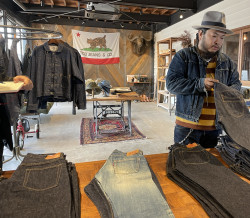
Dr. Milimo Maimbo, scientist
Zimbabwe

The first reaction is always, “Oh, you come from Zimbabwe!” And then, “Where is Zimbabwe?” And then of course, everybody knows the World Cup is in South Africa, so it’s so much easier to just say, “Do you know where the World Cup is? That’s where I come from.” It’s close by, so…
I wanted to study in a country that could give me the best opportunities in my field of study—molecular biology and genetics—and Japan is the best. So when the Mombusho scholarship came up, I applied. The Mombusho scholarship brings quite a number of Africans here. I was in Kochi for five years, then I went back for one year to finish my PhD, then I came back in 2008 to work.
Basically, I’m a research scientist. My work is genetics, molecular biology, biotechnology—trying to figure out how a host responds to a pathogen through its genetics, what is already predetermined by genetics to respond to a disease. We are trying to figure out ways we can then use that information to find a cure, find a way to stop a disease.
The thing is with science, it just keeps going. It never stops. So the techniques keep changing, things keep going forward. When you think you’ve found a solution, another question comes.
Japan is probably not among the top ten countries any Zimbabwean would want to go to. It’s not really a popular destination. You’re lucky to meet somebody who’s from Zimbabwe here.
I wanted something I could look back and say, “Oh my god.” And there are so many things that have happened here, that you think, “Wow, I saw this in my lifetime.” Just the experience of living here—everything from the food, the buses that always run on time, everything is so organized. And you tend to get used to that: everything is on time.
I think you kind of learn to be organized, more meticulous, with everything from your personal life to your work life. If you can make it perfect, that’s the best way to do it. And that’s an experience I think you’ll only get here. I’ve been to Australia, to the UK, and it’s not like that. You’re very spoilt here. Once you leave Narita, you have to be prepared for something else.
Aby “Braid,” hair artist
Senegal

I first came to Japan in 1995. I was married to a Japanese guy that I met in Senegal. My country was a French colony and the education program is French, so we had learned about “Japon du Meiji,” but I hadn’t learned about modern Japan.
Oh yeah, there was culture shock. It was a very big shock for me, coming from Senegal to here. You don’t speak the language, you don’t eat the food—you’re just far away. When I arrived, after the first day I wanted to go back home.
In 1998, when Beyoncé came out, everybody wanted to be Beyoncé. I was working in a hair salon in Shibuya, and it was the best job ever. They were lining up, Japanese people, to get their hair done like Lauryn Hill or Beyoncé. It was so funny. We were working until midnight, 1am, 2am.
In Africa, everybody knows how to do that. It’s about doing your sister’s hair, doing your neighbor’s, your mother’s hair—you do each other’s hair. We don’t usually go to the hair salon to get our hair done. My country is well-known for having the best braiders.
I worked there for two years, and then I started doing my own thing. I don’t need anything. All I need is a chair and a mirror.
My people are not going to go to a Japanese hair salon. If we have to go to a Japanese hair salon, what would they do with our hair? You cannot use the same shampoo, you cannot use the same products. The easiest thing for us is just to braid it and forget it.
All these people, they need me. So many people, they need me. It’s so funny when you get out, and they run up to you and say, “Who did your hair?” They’re desperate. “I do hair.” “You do? Please, do you have a card…?” I just opened my salon a year ago. I’ve never advertised.
Extensions are made by Japanese people, you know? It’s for black people, but it’s made by Japanese. There’s this huge company, they do carpets, fake carpets, fiber… They don’t even need it, but they know how to make it. I was shocked. It’s not fair. I know that they get all the products from Africa. They get hair, make it, send it to China for packaging, then sell it to Africa and America. We, black people, we cannot buy it here. We have to buy it from America.
Aby can be contacted at mailto:abybraid@yahoo.fr
Kuda Mutenda, fighter
Zimbabwe

I’ve been doing martial arts since I was eight. One of my uncles was a karate instructor, so I was sort of forced to: whenever I went to his house, he was like, “Come, come, be a man.”
When I finished high school, I wanted to go to university, and I thought maybe if I come to Japan I can do both: study and practice karate as well. When I came here, I did a one-year Japanese language course then I went to university. I’m doing development economics.
I don’t think I had problems settling in, because I had many friends from karate, and they were very willing to accept me for what I am. I lived with many people at the dojo, and when you live together, you get to the center, to the core of society. I lived with them, I practiced with them; we would go to the gym together, eat together, play together. It was very easy for them to accept me.
I was scouted for K-1. If you do karate, just like judo, you can’t become a professional. I have to adjust more than 90 percent of my fighting techniques, because in karate you don’t punch to the face, so you normally don’t cover your face with your hands. But if it’s K-1, you get punched in the face once and you’re finished, man. I need at least two, three years to get the drill. I think from next year I’ll be good to go.
I dance as well. I’ve been doing ballroom dancing and Latin dancing since I was in Zimbabwe. It’s more like a social activity. I’m a full-time student as well, so I have to be at school. It’s very difficult to do many things.
Development economics is what I’m going to do in the future. My aim is to go back to Zimbabwe and contribute to my country. Obviously I’ll be doing martial arts forever, but this is my main aim. I’m missing out on a great deal of change that is happening in Zimbabwe right now, so unless I understand that change, it’s very difficult for me to go back. I think the biggest problem, ten years from now, will be aligning what I’ve learned and the reality.
Most of the guys in Roppongi could be doing much, much more productive stuff—they would be doing much better jobs in Africa. They have a decent education, but because of political problems, cultural problems, they decide to come here, and then they’re earning three or four times what they do in Africa, but doing a worse job. If you could find some way to attract that talent back to Africa, things would be better.
I don’t blame them: I blame the situation. I think if things would stabilize, those guys could go back home. I think things could be better—for them, and for the country, and for the whole world. Because a better Africa is a better world.







